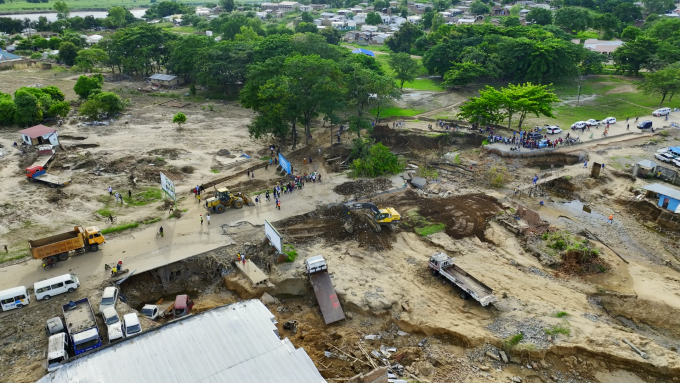Floods Leave Children in Despair

In the wake of devastating floods that have swept through Malawi districts, leaving communities submerged and families displaced, the voices of children like James* and Lucy* highlight the profound impact of the disaster on the most vulnerable.
Nkhotakota and Karonga are hardest hit districts.
James*, a 14-year-old boy from Nkhotakota, recalls the harrowing night when the floods invaded his home.
"On the night of February 27th, I awoke to find my bed damp. I suspected that my young brother had bed wetted. I shared the bed with him. Upon waking him, we discovered water had flooded our room," he recounts.
For four consecutive days, torrential rain had battered Nkhotakota relentlessly, causing the Dwangwa River to swell beyond its capacity. Eventually, it succumbed to the pressure, bursting its banks and unleashing floods into surrounding communities, leaving a devastating path of destruction in its wake.
The devastation was swift and severe.
“Hurriedly, we alerted our parents and realized the extent of the devastation as we made our way to higher ground. Our home was swept away.
“My father was successful businessman. He operated a thriving grocery store in our village, but it too and all the money kept in the home was swept away. “Our family now faces an uncertain future, grappling with the shock and grief of our sudden loss. Rebuilding will be challenging,” he says.
For a 13-year-old Lucy*, the flooding has left her with sadness and longing.
“The flooding took away everything from me. Life in the camp is really boring. I don't have any friends here, and I don't have any clothes. I want to go back home and go back to school. School is very exciting for me. I wish I could have a uniform, pens, and books so I can go back to school”, she says.
Emily Nthala, the Chairperson of the camp where James* and Lucy* have sought refuge, highlights the grim conditions experienced by displaced children and families.
"With a population exceeding 2,400, the majority being children, the camp is facing significant hygiene issues due to inadequate toilet facilities, prompting fears of a potential outbreak. Moreover, food scarcity is a pressing issue. We can barely provide two meals a day. Additionally, the prevalence of mosquitoes in the camp exposes children to the risk of malaria”, she says.
The toll of the floods extends beyond displaced families, as highlighted by the Director of Planning and Economic Development for Nkhotakota district Davies Kavalo.
"The impact has been heavily felt in transport and logistics," he acknowledges, pointing to the challenges hindering aid delivery and exacerbating the plight of affected communities.
“The livelihoods of communities have been severely affected, with rice irrigation schemes and fish dams being washed away, rendering families destitute,” he adds.
In Nkhotakota district, 80,434 people (including about 48,000 children) have been affected. Eight people have died, while 10, 529 people have been displaced, and learning accross 24 Schools has been interrupted.
Save the Children has joined the response to the crisis. Senior Area Operations and Humanitarian Manager Steve Kamtimaleka, outlines their efforts.
"Have supported the Interagency Assessment. Four of our staff were deployed to Nkhotakota to take," he explains.
"We have developed our response plan, focusing largely on Protection and Education. We need $250,000 to effectively respond. So far, we have only raised $100,000," Steve reveals, appealing to generous donors to bolster their support for the affected communities.
As Malawi grapples with the aftermath of the floods, the voices of James*, Lucy*, and countless other children serve as poignant reminders of the human toll of natural disasters on account of climate change.
Save the Children is also implementing projects aimed at enhancing community resilience to climate change across Malawi.

 Malawi
Malawi